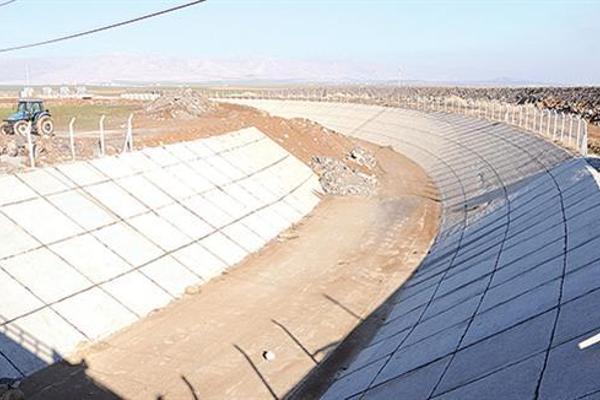New irrigation canal to bring water to Turkey’s Mardin
MARDİN – Anadolu Agency


AA photo
The southeastern province of Mardin – a historic Turkish city overlooking the Mesopotamian plains – is soon to have access to water, as a 19-year-long project to irrigate the region nears its end with the recent completion of a 221-kilometer man-made canal.Work on the remaining 25.3 kilometers of the canal was recently completed as part of a joint project carried out by the Forestry and Water Affairs Ministry and the General Directorate for State Hydraulic Works (DSİ).
The Mardin-Ceylanpınar irrigation channel project, which was originally launched in 1997, is set to irrigate over 2 million decares of agricultural land and contribute immensely to the region’s economy.
“We are irrigating 2,167,930 decares of land along the 221-kilometer canal. As part of this irrigation, 433,500 people will be employed,” the DSİ’s regional head, Oğuz Kasap, told state-run Anadolu Agency, adding the project would raise some 500 million Turkish Liras annually.
“The entire plain will have access to water by the end of 2019 with the Second GAP [Southeastern Anatolia Project] Action Plan,” Kasap added, to emphasize the project would not only benefit Mardin and neighboring Şanlıurfa province but the entire region.
Justice and Development Party (AKP) Mardin deputy Ceyda Bölünmez Çankırı also praised the project, defining the canal as “Turkey’s biggest river.”
“Turkey’s biggest river will be brought to the region, so to speak,” Çankırı said, adding expropriation efforts were ongoing in the region.
According to the deputy, some 4,350 decares of land was used in the Ambarlı village and a total 95 million liras was paid.
Local farmers also welcomed the news that the project was nearing its end, saying the irrigation channel would increase production and employment.
“We believe the region will develop with irrigation, that production will increase and a reverse migration will begin,” a farmer from Mardin, Mehmet Timurağaoğlu, said.
